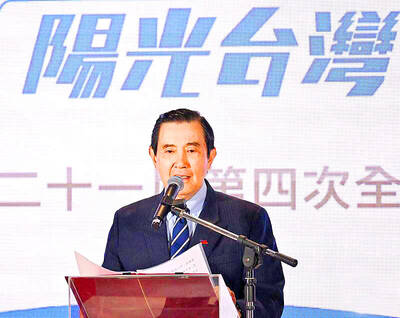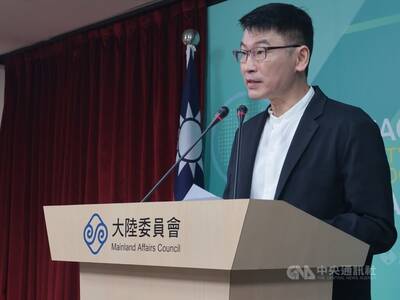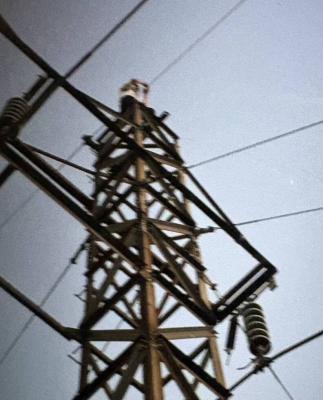Democratic Progressive Party (DPP) lawmakers yesterday called for more proactive action against climate change to keep pace with other nations, starting with amending a climate-related law to help industries reduce carbon emissions.
The legislators’ appeal comes a week after the EU unveiled a broad climate plan that includes a “carbon border adjustment mechanism,” which, if approved, would impose a border tax on imports from countries with less-stringent climate policies from 2026.
Japan has also indicated interest in creating a similar mechanism, while US Democrats on Monday introduced legislation that would impose a tariff on certain carbon-intensive imports.
This indicates that a new stage in the battle over global supply chains has begun, DPP Legislator Hung Sun-han (洪申翰) told a virtual news conference, adding that as a major exporter, Taiwan must be proactive in response.
“Many friends in industry are well aware that this is a hurdle to their survival,” so they are greatly concerned about the progress of government policy, he said.
“They hope the government can back their move toward a low-carbon economy,” he added.
A crucial milestone in this transition would be a complete overhaul of the Greenhouse Gas Reduction and Management Act (溫室氣體減量及管理法), he said.
In December last year, a bipartisan group of 20 legislators introduced a bill to replace the act, which Hung at the time said had proven incapable of curbing greenhouse gas emissions.
The bill includes a carbon levy — a key component to meeting the proposed EU regulation, Hung said.
No one is a bystander in the fight against climate change, Deputy Legislative Speaker Tsai Chi-chang (蔡其昌) said, adding that the government must take on the greatest responsibility.
Seven amendments to the act have been proposed by the legislature, Tsai said, calling on the Executive Yuan to propose its own version as soon as possible, so the matter could be deliberated during this legislative session.
The Environmental Protection Administration (EPA) earlier this year announced a NT$100 tax per tonne of carbon emissions, but it is unclear whether the minimal sum would have the desired effect of curbing emissions to meet international standards, DPP Legislator Su Chiao-hui (蘇巧慧) said.
However, a report published in July last year by a British think tank commissioned by the EPA and British Office Taipei suggested starting from a base tax of NT$300 per tonne of carbon emitted, to be adjusted upward over time, Su added.
Not only must the act be amended, but the EPA, the Ministry of Economic Affairs and other agencies must take part in making and enforcing rules on carbon pricing, and drawing up a roadmap for carbon reduction, she said.
The EU would only become tougher on the issue, “so if you have to pay a carbon tariff, why not pay your own people first?” DPP Legislator Michelle Lin (林楚茵) said.
The government should take a gradual approach, first adopting a carbon fee to get industries used to the cost and using public funds to reduce emissions, before eventually falling in line with EU standards, she said.
Businesses should publish corporate social responsibility documents that clearly show annual emissions, and set near, middle and long-term carbon reduction goals, she added.
At the same time, regulatory mechanisms should be set up to track progress and set a unified definition of “carbon neutrality,” Lin said.
Lastly, environmental, social and governance (ESG) criteria should be used to encourage banks to give preferential loans to companies with good ESG ratings, she added.

‘ANGRY’: Forgetting the humiliations and sacrifices of ‘the people of the Republic of China’ experienced disqualified Lai from being president, Ma Ying-jeou said Former president Ma Ying-jeou (馬英九) yesterday criticized President William Lai (賴清德) over what he called “phrasing that downplayed Japan’s atrocities” against China during World War II. Ma made the remarks in a post on Facebook on the 80th anniversary of the end of World War II. Ma said he was “angry and disappointed” that Lai described the anniversary as the end of World War II instead of a “victory in the war of resistance” — a reference to the end of the Second Sino-Japanese War (1937-1945). The eight-year war was a part of World War II, in which Japan and the other Axis

The Mainland Affairs Council (MAC) yesterday announced a ban on all current and former government officials from traveling to China to attend a military parade on Sept. 3, which Beijing is to hold to mark the 80th anniversary of the end of the Second Sino-Japanese War. "This year marks the 80th anniversary of the end of World War II and the Republic of China’s victory in the War of Resistance [Against Japan]," MAC Deputy Minister and spokesperson Liang Wen-chieh (梁文傑) told a regular news briefing in Taipei. To prevent Beijing from using the Sept. 3 military parade and related events for "united

‘OFFSHORE OPERATIONS’: Also in Dallas, Texas, the Ministry of Economic Affairs inaugurated its third Taiwan Trade and Investment Center to foster closer cooperation The 2025 Taiwan Expo USA opened on Thursday in Dallas, Texas, featuring 150 Taiwanese companies showcasing their latest technologies in the fields of drones, smart manufacturing and healthcare. The Taiwan External Trade Development Council (TAITRA), the event’s organizer, said the exhibitors this year include Hon Hai Precision Industry Co (Foxconn), the world’s largest contract electronics manufacturer; AUO; PC brand Asustek Computer; and drone maker Thunder Tiger. In his opening speech, TAITRA chairman James Huang (黃志芳) said he expected Texas to become a world-class center for innovation and manufacturing as US technology companies from Silicon Valley and Taiwanese manufacturers form an industrial cluster

A 20-year-old man yesterday evening was electrocuted and fell to his death after he climbed a seven-story-high electricity tower to photograph the sunset, causing a wildfire on Datong Mountain (大同山) in New Taipei City’s Shulin District (樹林), the Taoyuan Police Department said today. The man, surnamed Hsieh (謝), was accompanied on an evening walk by a 20-year-old woman surnamed Shang (尚) who remained on the ground and witnessed the incident, capturing a final photograph of her friend sitting atop the tower before his death, an initial investigation showed. Shang then sought higher ground to call for help, police said. The New Taipei